
The Holy Grail is a treasure that serves as an important motif in Arthurian literature. Various traditions describe the Holy Grail as a cup, dish, or stone with miraculous healing powers, sometimes providing eternal youth or sustenance in infinite abundance, often guarded in the custody of the Fisher King and located in the hidden Grail castle. By analogy, any elusive object or goal of great significance may be perceived as a "holy grail" by those seeking such.
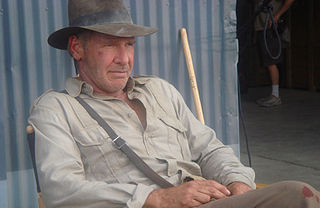
Dr. Henry Walton "Indiana" Jones Jr. is the title character and protagonist of the Indiana Jones franchise. George Lucas created the character in homage to the action heroes of 1930s film serials. The character first appeared in the 1981 film Raiders of the Lost Ark, to be followed by Indiana Jones and the Temple of Doom in 1984, Indiana Jones and the Last Crusade in 1989, The Young Indiana Jones Chronicles from 1992 to 1996, Indiana Jones and the Kingdom of the Crystal Skull in 2008, and Indiana Jones and the Dial of Destiny in 2023. The character is also featured in novels, comics, video games, and other media. Jones is also the inspiration for several Disney theme park attractions, including Indiana Jones and the Temple of Peril, the Indiana Jones Adventure, and Epic Stunt Spectacular! attractions.
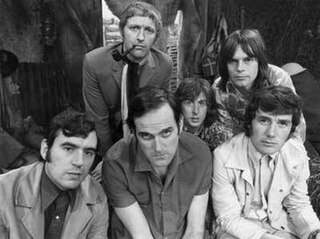
Monty Python were a British comedy troupe formed in 1969 consisting of Graham Chapman, John Cleese, Terry Gilliam, Eric Idle, Terry Jones, and Michael Palin. The group came to prominence for the sketch comedy series Monty Python's Flying Circus, which aired on the BBC from 1969 to 1974. Their work then developed into a larger collection that included live shows, films, albums, books, and musicals; their influence on comedy has been compared to the Beatles' influence on music. Their sketch show has been called "an important moment in the evolution of television comedy".
UFO conspiracy theories are a subset of conspiracy theories which argue that various governments and politicians globally, in particular the United States government, are suppressing evidence that unidentified flying objects are controlled by a non-human intelligence or built using alien technology. Such conspiracy theories usually argue that Earth governments are in communication or cooperation with extraterrestrial visitors despite public disclaimers, and further that some of these theories claim that the governments are explicitly allowing alien abduction.

Laurence Gardner was a British author and lecturer. He wrote on various topics including historical-religious speculation such as the Jesus bloodline.

The Château de Montségur is a former fortress near Montségur, a commune in the Ariège department in southern France. Its ruins are the site of a razed stronghold of the Cathars. The present fortress on the site, though described as one of the "Cathar castles," is actually of a later period. It has been listed as a monument historique by the French Ministry of Culture since 1862.

Robert Lionel Fanthorpe, FCollP, FRSA, FCMI is a retired British priest and entertainer. Fanthorpe also worked as a dental technician, journalist, teacher, television presenter, author and lecturer. Born in Dereham in Norfolk, he lives in Cardiff in South Wales, where he served as Director of Media Studies and tutor/lecturer in Religious Studies at the Cardiff Academy Sixth form college.
Richard Harris Leigh was a novelist and short story writer born in New Jersey, United States to a British father and an American mother, who spent most of his life in the UK. Leigh earned a BA from Tufts University, a master's degree from the University of Chicago, and a PhD from the State University of New York at Stony Brook.
The Jesus bloodline refers to the proposition that a lineal sequence of the historical Jesus has persisted, possibly to the present time. Although absent from the Gospels or historical records, the concept of Jesus having descendants has gained a presence in the public imagination, as seen with Dan Brown's 2003 best-selling novel The Da Vinci Code and its 2006 movie adaptation of the same name that used the premise for its plot. It is dismissed generally by scholars. These claimed Jesus' bloodlines are distinct from the biblical genealogy of Jesus, which concerns the ancestors of Jesus, and from the documented Brothers of Jesus and other kin of Jesus, known as the Desposyni.
The original historic Knights Templar were a Christian military order, the Order of the Poor Fellow Soldiers of Christ and of the Temple of Solomon, that existed from the 12th to 14th centuries to provide warriors in the Crusades. These men were famous in the high and late Middle Ages, but the Order was disbanded very suddenly by King Philip IV of France, who took action against the Templars in order to avoid repaying his own financial debts. He accused them of heresy, ordered the arrest of all Templars within his realm, put the Order under trial and many of them burned at the stake. The dramatic and rapid end of the Order led to many stories and legends developing about them over the following centuries. The Order and its members increasingly appear in modern fiction, though most of these references portray the medieval organization inaccurately.
Omar al-Qattan is a Palestinian Kuwaiti film director and film producer.
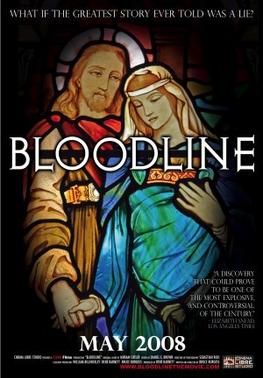
Bloodline is a 2008 documentary film by Bruce Burgess and Rene Barnett, a filmmaker with an interest in paranormal claims, focused on the "Jesus bloodline" hypothesis and other elements of the 1982 book The Holy Blood and the Holy Grail.

Graham Phillips is a British author. Phillips has a background working as a reporter for BBC radio, and he was the Founding Editor (1979) of Strange Phenomena magazine. He has made a number of controversial claims concerning the Arthurian legend, such as the discovery of the 'Hawkstone Grail', a small stone cup that he claims is the original Holy Grail; the identification of a Roman ruin as the "historical Camelot"; and the claim to have discovered King Arthur's grave. He has also investigated various biblical mysteries, again presenting some controversial theories, such as an alternative location for Mount Sinai at Petra in Jordan, an Egyptian staff in a British museum as the staff of Moses, and a grave on the British island of Anglesey as the tomb of the Virgin Mary.
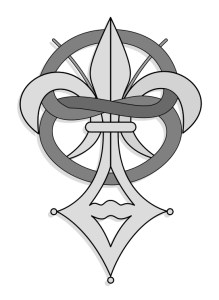
The Prieuré de Sion, translated as Priory of Sion, was a fraternal organisation founded in France and dissolved in 1956 by Pierre Plantard in his failed attempt to create a prestigious neo-chivalric order. In the 1960s, Plantard began claiming that his self-styled order was the latest front for a secret society founded by crusading knight Godfrey of Bouillon, on Mount Zion in the Kingdom of Jerusalem in 1099, under the guise of the historical monastic order of the Abbey of Our Lady of Mount Zion. As a framework for his grandiose assertion of being both the Great Monarch prophesied by Nostradamus and a Merovingian pretender, Plantard further claimed the Priory of Sion was engaged in a centuries-long benevolent conspiracy to install a secret bloodline of the Merovingian dynasty on the thrones of France and the rest of Europe. To Plantard's surprise, all of his claims were fused with the notion of a Jesus bloodline and popularised by the authors of the 1982 speculative nonfiction book The Holy Blood and the Holy Grail, whose conclusions would later be borrowed by Dan Brown for his 2003 mystery thriller novel The Da Vinci Code.
Henry Soskin, better known as Henry Lincoln, was a British author, television presenter, scriptwriter, and actor. He co-wrote three Doctor Who multi-part serials in the 1960s, and — starting in the 1970s — inspired three Chronicle BBC Two documentaries on the alleged mysteries surrounding the French village of Rennes-le-Château — and, from the 1980s, co-authored and authored a series of books of which The Holy Blood and the Holy Grail was the most popular, becoming the inspiration for Dan Brown's 2003 best-selling novel, The Da Vinci Code. He was the last living person to have written for Doctor Who in the 1960s.

The Holy Blood and the Holy Grail, published as Holy Blood, Holy Grail in the United States, is a book by Michael Baigent, Richard Leigh, and Henry Lincoln. The book was first published in 1982 by Jonathan Cape in London as an unofficial follow-up to three BBC Two TV documentaries that were part of the Chronicle series. The paperback version was first published in 1983 by Corgi books. A sequel to the book, called The Messianic Legacy, was originally published in 1986. The original work was reissued in an illustrated hardcover version with new material in 2005.
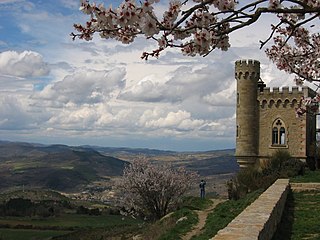
Rennes-le-Château is a commune approximately 5 km south of Couiza, in the Aude department in the Occitanie region in Southern France.

Rob Edwards is an American television and feature film screenwriter and producer. His writing includes the Disney animated feature films Treasure Planet and The Princess and the Frog, both of which were nominated for the Academy Award for Best Animated Feature. In 2009, along with Ron Clements and John Musker, Edwards was awarded the Best Screenplay award from the African-American Film Critics Association for The Princess and the Frog.
Zhou Bing is a Chinese documentary director. He holds a PhD from the College of History at Nankai University. Zhou has been named "Best Documentary Film Director" three times and has created over 100 documentaries and other productions. His works include Palace, Dun Huang, and Road of Millennia Bodhi. All three aired on CCTV, National Geographic, SKY TV, the History Channel, Arte, and NDR. Currently, he runs the Beijing Oriental Elites Culture Development Co. Ltd and works with Tiong Hiew King, the Datuk of Tan Sri, Malaysia, at Sun Media International Co. Ltd. and Zero Media International Co. Ltd. Throughout his career, Zhou has attempted to combine the industrialized process of documentary film making with the identity of independent directors. Zhou is also an adjunct professor in the Department of Media and Communication at the City University of Hong Kong. Zhou aspires to broadcast Chinese culture to the world through photographs and images.











